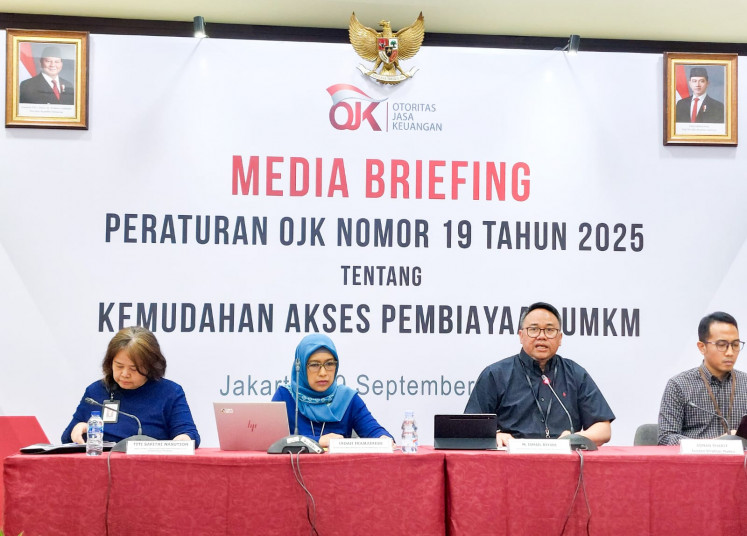Popular Reads
Top Results
Can't find what you're looking for?
View all search resultsPopular Reads
Top Results
Can't find what you're looking for?
View all search resultsChinese papers attracting younger readers
Eight years ago, when local Chinese newspapers began emerging in the city, it was hard for them to attract writing contributions from their readers
Change text size
Gift Premium Articles
to Anyone
Eight years ago, when local Chinese newspapers began emerging in the city, it was hard for them to attract writing contributions from their readers.
Over time, however, things have changed, albeit only a little.
"When I set up a page publishing writing from children and youths, I had to ask my own grandchild to write something just to fill the page," said Bambang Suryono, the chief editor of Yin Ni Guo Ji Ri Bao (Indonesian International Daily News).
The 20-page Guo Ji Ri Bao, first published in 2001, started a page the next year dedicated to contributions from young readers.
"Now school children as young as kindergarteners are lining up to have their writing published in this newspaper," he said.
Bambang is no novice in the newspaper business. Born more than seven decades ago, he once worked for the Chinese edition of Warta Bakti until it was closed down by the government in 1965.
Warta Bakti was once known as Sin Po daily, one of the largest newspapers for the Chinese-Indonesian community before the country's independence.
Bambang, who is also known as Lie Zuo Hui, said more readers began contributing to the paper's Chinese-Indonesian forum page.
"Back in the old days, I was forced to write on a daily basis for the sake of filling the opinion page. In the past two years, I've seen about 10 articles each day, hundreds or more in a month, sent throughout the archipelago. That's a good sign for a Chinese newspaper."
However, this does not mean all is looking bright for his paper. Bambang said Chinese newspapers in general did not get many young readers or contributors who could write well in Chinese.
Because Soeharto's regime banned Chinese schools throughout the country, he said, at least one generation was deprived of learning the language.
Chief editor of the Chinese business daily Indonesia Shang Bao, Sunardi Mulia, said most of the paper's readers were above 55 years old.
"They are those who once went to local Chinese schools," he said. "More and more of those aging readers are passing away."
After the reformation era in 2001, Sino-Mandarin courses started to sprout in the city. However, Bambang said new Chinese language students were not yet apt to read Chinese newspapers.
"They can write simple articles about their daily activities, but not on complex subjects."
Out of his editorial staff of 20, there are only four journalists that can write in Chinese, and the youngest is 58 years old. "It's so hard to find young people that can write in Chinese," Bambang said.
Sunardi's paper, established in 2000, is facing the same problem. It does not have many reporters, he said. "I have to really roll up my sleeves to report large events."
About 90 percent of Shang Bao's editorial team are over 50.
Sunardi said people needed to at least master 3,000 Chinese characters to be able to comprehend the content in Chinese newspapers. The Kangxi dictionary, however, contains a complete compilation of 47,000 Chinese characters, although most are rarely used today.
"It's true more young people have begun learning the language. However, it will take time for them to improve because their cultural surrounding is completely different than previous generations."
"A lot of their parents cannot speak Mandarin or read Chinese anymore," said Sunardi.
"So their opportunities to practice and communicate with the language are very limited. They probably need 15 years or so before they can read fluently," said Sunardi, 59.
Before working for Shang Bao, Sunardi worked for Jakarta-based Chinese paper Universal Daily News, or Shi Jie Ri Bao, which was closed down two years ago.
There are currently three Chinese newspapers distributed in Jakarta; before there were six that had emerged since 2000, after the Abdurrahman Wahid and Megawati Soekarnoputri administrations lifted a number of bans on public displays of Chinese culture.
"Only those that have a lot of advertising can survive. Even we are currently in the red. We subsidize Rp 500 to Rp 600 per copy," said Bambang.
He said Guo Ji Ri Bao distributed 60,000 copies per day. The publication is distributed nationwide and a third of those are in Jakarta.
Sunardi said "When there are many readers, advertising is not hard to find."
Shang Bao currently distributes 10,000 copies, mostly in Jakarta, each day. The paper also reaches readers in Medan, Batam, Bandung, Surabaya and Ujung Pandang, he said.
"The number of our readers is slowly but surely growing," Sunardi said.
Sunardi said the paper's marketing target was mostly foreign investors and businesspeople from China and Taiwan.
"Many foreign companies from China, Hong Kong, Malaysia and Singapore open an office here. They need to read news in Chinese," said Bambang.
He said more than 1 million people from mainland China had migrated to Southeast Asia since 2000.
"Of the 1 million, about 200,000 have come to Indonesia. So we are optimistic about the future of our paper; a 10 to 20 percent increase of readership annually."
Besides Guo Ji Ri Bao and Indonesia Shang Bao, there is Harian Indonesia Yin Ni Sin Chew Ri Bao. The name was derived from the cooperation of two media groups, namely the local Mahaka Group -- current owner of Harian Indonesia -- and Malaysia's Sin Chew Ri Bao, which has been the country's leading newspaper since late 2006.
Harian Indonesia was established in 1966 as the only Chinese newspaper that existed in the country. It was controlled by the erstwhile government's Coordinating Body for Chinese Affairs, operating under the Intelligence Coordinating Body (Bakin).
The newspaper's chief executive officer, William Tjugiarto, said Harian Indonesia's cooperation with the Malaysian-Chinese paper served to improve its image from being once government-controlled to now being independent.
The paper consults the Kuala Lumpur-based Sin Chew Ri Bao, which has four staff members in Jakarta, on editorial and technical matters.
He said his company currently printed 55,000 copies of Harian Indonesia a day.










